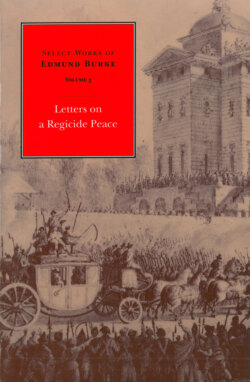Select Works of Edmund Burke: Letters on a Regicide Peace

Реклама. ООО «ЛитРес», ИНН: 7719571260.
Оглавление
Edmund Burke. Select Works of Edmund Burke: Letters on a Regicide Peace
Отрывок из книги
SELECT WORKS OF EDMUND BURKE
VOLUME 3
.....
But fortune suddenly put a new resource into Mr. Pitt’s hands. A war of aggression carried on on every frontier could not be long carried on without reverses: and the French arms in the summer of 1796 sustained a serious check. Secure on the side of the Netherlands, France was pushing to the utmost the advantages she had gained on the Rhine and in Italy. The plan of the war was bold and simple. On the Rhine were Jourdan and Moreau: in Italy Bonaparte had established a base of operations by the submission of Sardinia. Jourdan and Moreau were to unite and push on by the valley of the Danube, while Bonaparte, after sweeping Northern Italy of the Austrians, was to force the passes of the Tyrol, unite with Moreau and Jourdan, and pour the whole forces of the French Republic on Vienna. Fortune steadily attended the French arms in Italy: and nothing in the world seemed more unlikely than reverses in Germany. Once more Frankfort was occupied and pillaged: the important princes of Baden and Wirtemberg, and the nest of petty sovereigns who were included in the Circle of Swabia, hastened to buy peace by submission and contributions. The defence of the Empire had been entrusted to the Archduke Charles, a young general not wholly unworthy of the praise which Burke bestows upon him. Placed between the two armies of Moreau and Jourdan, he was compelled to retreat before them step by step, until a blow well-directed on the former general at Donauwerth separated him from his artillery and stores and compelled him to a temporary pause. Turning his success to instant advantage, Charles left a small force to keep Moreau in check, and drew off the bulk of his army to fall with crushing force upon Jourdan. After a few days’ skilful manoeuvring, he completely defeated him in the battle of Amberg. This victory completely frustrated the plans for the German campaign. Jourdan was obliged to flee in disorder to the Lower Rhine, losing in his retreat, if it could be dignified with the name, nearly half his army. Moreau pushed on into Bavaria: but the disaster sustained by Jourdan, and the daily reinforcements poured into the Imperial ranks, made it necessary to commence a retreat, which he effected in so masterly a manner as to entitle it to high celebrity among military exploits.
[xxx]Jourdan’s failure naturally kindled fresh hopes in those who believed the French might yet listen to reasonable proposals of peace. So severe a blow could not but tend to bring the Directory to reason. The English Ministry at once seized the opportunity. As soon as the news reached the Cabinet, a note was despatched to the Danish Minister in London, enclosing a request to be delivered to the Directory through the Danish Minister at Paris. The enclosure was brief, and intended to bear in every line marks of plainness and sincerity. It requested a passport for an English envoy, who was to proceed at once to Paris, and ascertain, by direct consultation with the French Government, if any base of pacification could be laid down. Such an application, at such a moment, could not but prepossess the French in favour of English sincerity. It would show that in spite of the favourable turn taken by the war, England was anxious to put an end to it.
.....